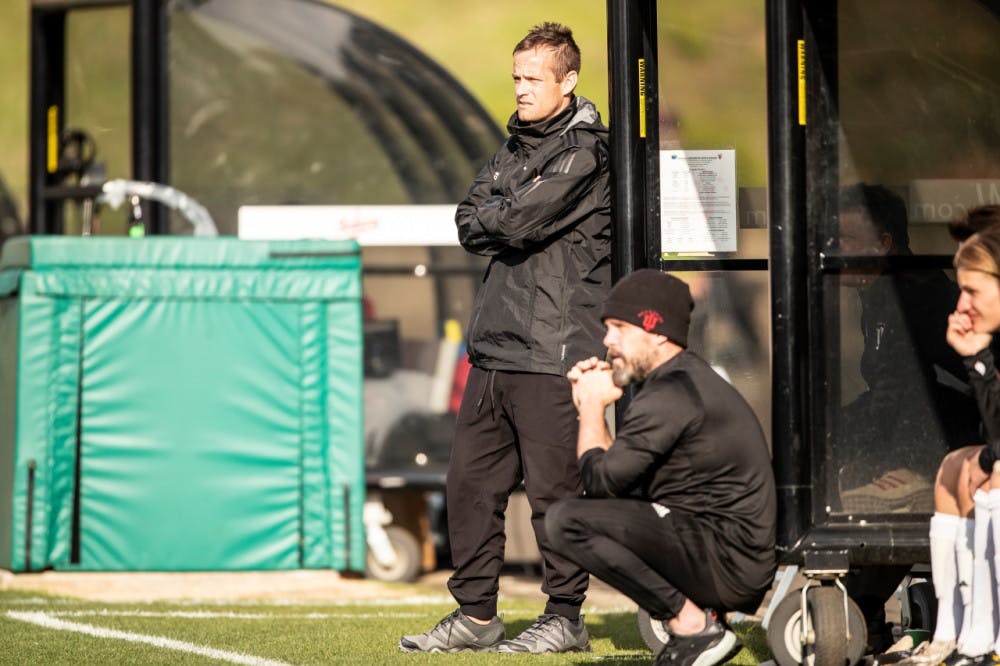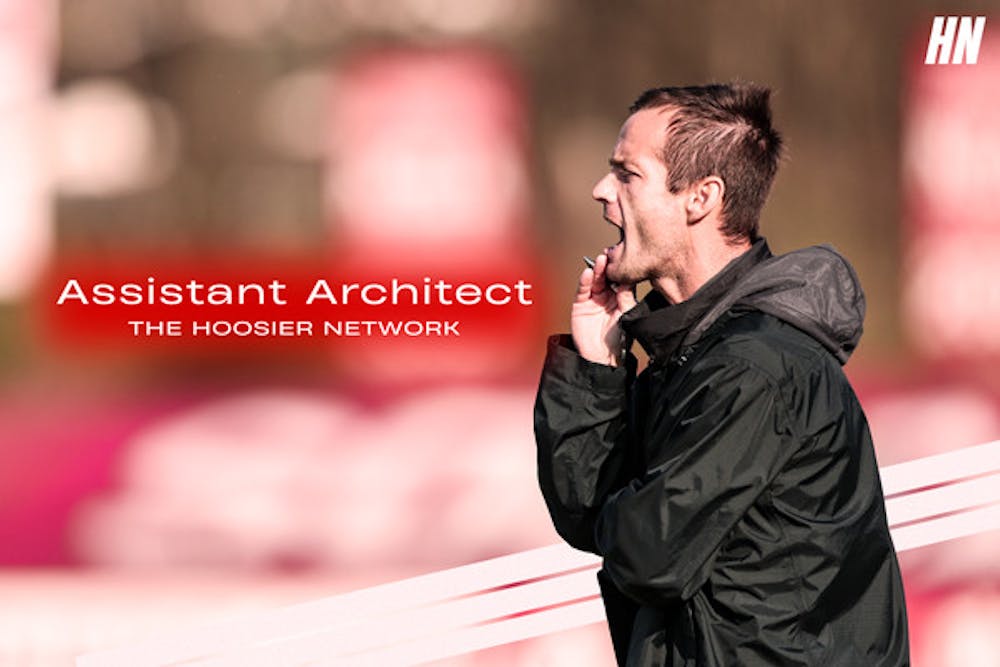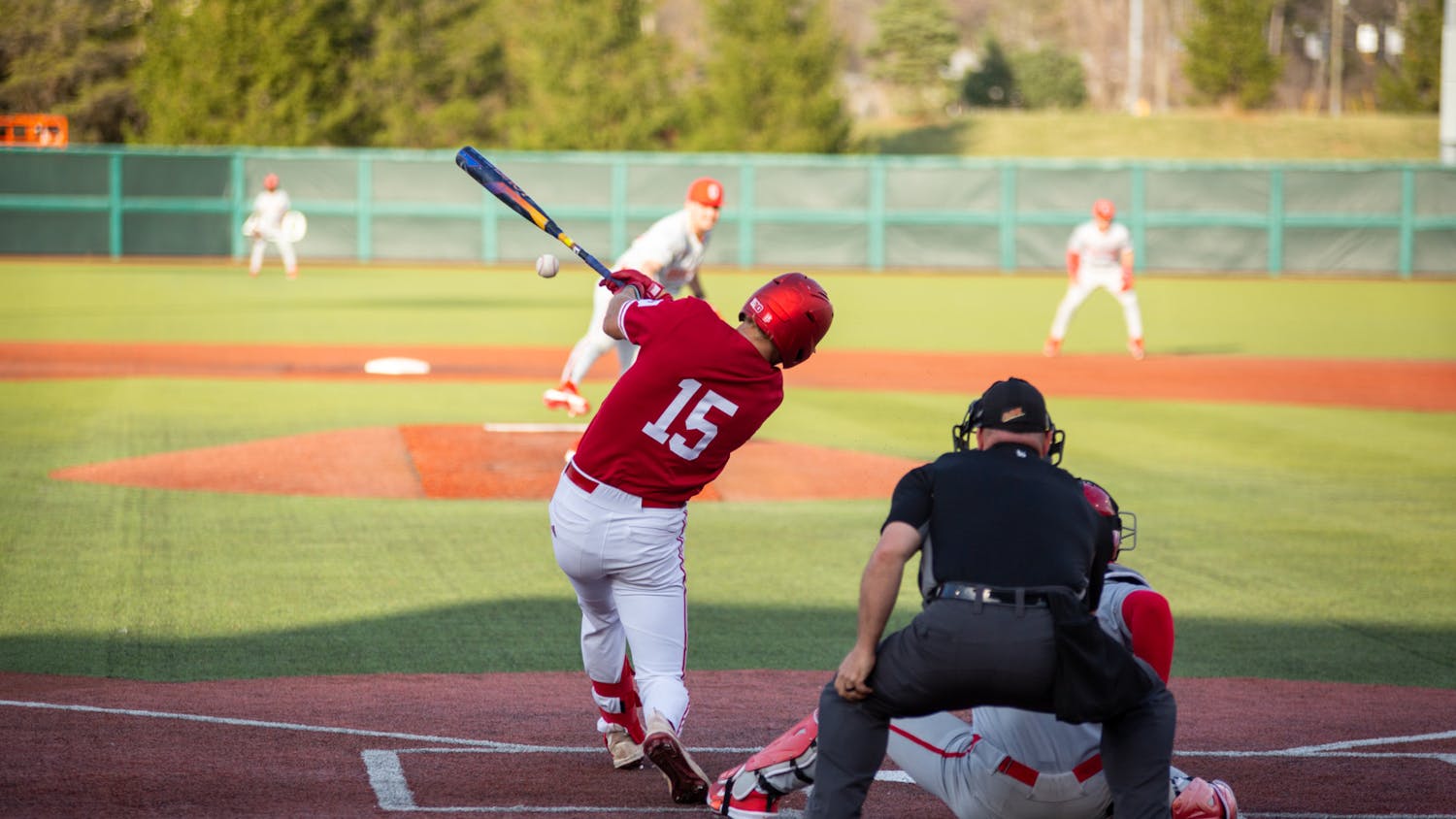Now boarding — Dallas to Indianapolis.
Estimated flight time — Two hours.
Two hours? What’s a head men’s soccer coach and a recruiting coordinator supposed to talk about for two hours? Simple: Recruiting, recruiting and more recruiting.
So that’s what IU head coach Todd Yeagley and associate head coach Kevin Robson did in late June on a flight back to Indiana. The pair had just spent the past few days at a showcase event in Dallas. Nothing new; busy offseason recruiting is part of the job, especially for Robson who was named IU’s recruiting coordinator in 2017 and later elevated to associate head coach in early August of this year.
By week’s end, several prospects landed on IU’s radar, some probably talented enough to land an offer on the spot, others in need of more evaluating. But before any formalities could begin, Yeagley and Robson first needed to reconvene. Their cramped plane seats would have to suffice as a makeshift office, as they often do on recruiting trips.
And they talked. And talked. And talked. Not stopping until the wheels landed back on Indiana soil. “We legitimately didn’t have a break,” Robson says a month later. It’s true, recruiting waits for no one, certainly not for an eight-time national-championship program that pumps out professional players like a high-powered factory.
After nearly 10 years spent on the same coaching staff -- Yeagley taking the reins in 2009, Robson arriving in 2013 -- it’s not often that they don’t see eye to eye nowadays. The backbone of it all is an implicit trust between Yeagley and the rest of IU’s coaching staff, one where distinct responsibilities are doled out and excellence is the expectation.
But it’s also a two-way street. A mutual understanding that none of this -- the Big Ten titles, College Cup appearances, All-American selections, blue-chip commitments etc. -- happens without them.
“When you’re working for Yeags, it’s not like you’re working for him,” Robson says. “He definitely makes you feel like you have ownership in this program, and he gives you a lot of responsibilities… I almost just don’t want to let him down because of the leap of faith he took in me. That’s how I approach things, I don’t ever want to disappoint him.”
Robson had it made in the corporate world.
Within just a year of graduating from IU with a communications degree, he had already landed a job as a marketing representative with Anheuser-Busch, the $50-billion beer company. While his starting wage was nice, the job description was even sweeter.
He got to live in Boston for a year, then Denver for three more, traveling coast-to-coast to events like the Sundance Film Festival, the MLB All-Star Game, the Tostitos Fiesta Bowl, the Daytona 500, networking with top executives, climbing the corporate ladder, and beginning his life post-soccer.
After four seasons playing for the Hoosiers, winning national titles in 2003 and 2004, and a brief stint as a student coach at IU in 2007, Robson was simply ready to move on and chase new endeavors. Though soccer would always be around in some form or another, the idea of experiencing the other side of life, void of stringent practice schedules or nagging injuries, was tantalizing.
So he gave it a try. It lasted about two years.
By late 2010, he was sucked right back into the game. His mind was all-in on the corporate world, but his heart was set on coaching.
“That’s what I wanted to do most,” Robson says.
He didn’t suddenly plunge headfirst into the coaching depths and abandon the progress he’d made at Anheuser-Busch, though. The risk was too much at the time, he says. Instead, he maintained his normal day job, living in Denver at the time, while moonlighting as the head coach of the Real Colorado Soccer Club U-18 boys team.
To be back on the field and developing young players was rejuvenating for Robson, even if it was for only a few hours a week. The pinging of soccer balls off goal posts, the booming thud of cleats launching shots into the night sky, you just couldn’t replicate that symphony of sounds. It was music to Robson’s ears.
“I’d go into the office (at Anheuser-Busch), but my favorite times of the day were from 6 (p.m.) to 8 (p.m.), being with my players,” Robson says.
It was clear that coaching made Robson the happiest, even if he wasn’t ready to admit it to himself. So the juggling act continued for three more years -- account manager by day, club soccer coach by night. But this could only go on for so long before he had to make a definitive career decision, because wearing multiple hats at once wasn’t feasible long term.
Fortunately, he didn’t have to search very far for an answer.
In the summer of 2013, IU had an opening for a volunteer assistant coach. With the Hoosiers fresh off an eighth national title and Yeagley on a fast-track to reestablish IU’s place atop the college soccer kingdom, the circumstances were near-perfect. If Robson was going to bet on himself, now was the time.
“I gave up a lot of money and a good career to kind of take a chance on becoming a coach,'' Robson says. “And it’s paid off.”
In hindsight, that could not have been a bigger understatement. It took only one season as a volunteer before Yeagley promoted Robson to a full-time assistant coach. Three years later, he’d again be elevated to IU’s recruiting coordinator. And ahead of the 2021 fall season, he earned the title of associate head coach, a distinction given to only one other person, Brian Maisonnueve, in Yeagley’s 11 seasons leading the program.
All that in just eight years, not to mention the countless All-Big Ten selections, MAC Hermann Trophy finalists, Big Ten titles and College Cup appearances.
But had it not been for the time spent coaching club soccer in Denver, maybe Robson never finds his way back to Bloomington. Maybe he’s still making inroads up the corporate chain at Anheuser-Busch. Maybe soccer becomes an afterthought, of something he once was but no longer is.
Robson has no time to ponder the what-ifs.
There are recruiting battles to be won and stars to be added to the IU jersey.

Robson was standing in his kitchen when he got the phone call three years ago. It was Yeagley on the other end.
The news sounded bleak; a fierce, year-long recruiting battle for the No. 25 recruit in the nation had ceased. The decision was made. Indiana, however, didn’t seem like the final destination.
Yeagley let the disappointment stew, his soft-spoken tone slashing through Robson’s silence on the other end of the call.
Robson admits he should’ve known better, not about the recruitment but about Yeagley’s penchant for shenanigans and playful banter. Even the commitment of a generational talent couldn’t stop Yeagley from first having some fun; it’s his way of keeping situations light, no matter how tense they may be for Robson.
Then came the real news: “He chose Indiana.”
Jack Maher, the highly-coveted center back from Caseyville, Ill., had just committed to the Hoosiers over the likes of Notre Dame, North Carolina, Duke, Stanford and a laundry list of other powerhouse programs.
A celebration ensued in Robson’s kitchen.
Five minutes later, his phone rang again. It was Maher calling to personally affirm his verbal commitment. The celebration continued.
“He was one that was a program changer,” Robson says with a wide smile. Two years later, Jack would parlay into Joey, the younger sought-after Maher who succeeded Jack on Indiana’s backline in the 2021 spring season.
It was a landmark recruiting win for Robson, who led Indiana’s year-long-plus pursuit of both Maher’s. Not only did it reinforce the Hoosiers’ stranglehold over premier talent in the Midwest, but it also cemented Robson’s status as one of college soccer’s burgeoning young minds.
The recruiting classes that followed lived up to the same billing under Robson’s tutelage. In 2019, star striker Victor Bezerra arrived in Bloomington alongside future MLS players Josh Penn and Aidan Morris and a little-known goalkeeper named Roman Celentano. 2020: The No. 3-ranked recruiting class in the nation. 2021: The No. 6-ranked recruiting class.
In the seven seasons since Robson was added to the coaching staff, Indiana has never had a recruiting class ranked outside the top 20.
There’s a meticulous strategy to all of it, though. It’s not as if Robson was simply handed the keys to IU’s proverbial recruiting car, cruised around the country, flashed the program’s eight stars and myriad accolades to a bunch of heralded prospects, and waited by the phone for a commitment.
Rather, Robson’s recruiting efforts rarely stray from the rock-steady foundation that the IU juggernaut has hung its hat on for decades. “The Midwest is what we’re built on,” he says unabashedly, pointing out long-forged relationships and pipelines in St. Louis, Chicago, Indianapolis and Columbus.
However, he and the coaching staff also aren’t ignorant to the widespread shift happening in college soccer. That is, while IU continues to succeed with its midwestern flair, dozens of programs across the country have seemingly engaged in an arms race for international talent.
Think that’s going to change IU’s philosophy? Not if Robson and Yeagley are still around.
“We’re not naive to think that some of these international players might be more talented or more ready, we see that,” Robson says. “But we really believe in our identity and hammering those hot markets.”
As the saying goes, if it’s not broke don’t fix it, and there’s a level of inherent comfort, he says, in a formula that’s helped the Hoosiers reach three College Cups in the past four seasons.
But the process isn’t as clear-cut as one might perceive. The recruiting pitch can’t simply harp on IU’s vast tradition, and Robson acknowledges that. When recruits commit to Indiana, they’re also committing to a belief in development and a dream of playing professional soccer.
“We always say it’s not your first contract, it’s your second contract that makes your pro career,” Robson says, “We want those guys to be ready for that next level to really crush it in their first contract (so they can earn a second contract).”
But what about the majority of players who veer away from soccer like Robson did and go off to live a normal life after college -- the ones who gave four or five years to the program but are ready for life after soccer?
Yeagley and Robson also have a plan for them, too. In particular, Robson name-drops former players such as Kerel Bradford, Frankie Moore and Harrison Petts, among dozens of others, who have thrived in the private sector since graduating from Indiana.
Bradford, part of IU’s 2012 national championship team, had opportunities to pursue a professional soccer career. With Yeagley and Robson’s guidance, though, he chose a different path.
“The one thing about them is that it wasn’t an option for anything less than excellence.” Bradford says. “If you want to go play pro, then, hey, we’re going to put in the work and we’re going to make you excellent. If you want to go get your Master’s degree -- which I did -- or you want a professional working career, then you’re going to go put in that work and be excellent. So I appreciated that fatherly coaching advice.”
And that advice continues to manifest in every recruiting pitch, no matter the recruiting ranking or professional aspirations.
For Robson, building relationships and seeing former players find success is what ultimately matters to him, and it’s what has allowed him to flourish on the recruiting trail.
“You’ve got to understand how to relate with the players, I think that’s the biggest thing as a coach.” Robson says. “We can talk X’s and O’s all day, but if your players buy in and they connect with you, I think you’re going to win games and they’re going to be excited to play and be around the game.”
By now, it seems the newly-anointed associate head coach has it all figured out as he enters his eighth season in Bloomington. He’s got the charisma, he’s got the moxie, he’s got the wealth of soccer knowledge and he’s got the recruiting chops.
So what’s next, then, aside from chasing the elusive ninth national title? How much more is there for Robson to realistically accomplish at IU?
He says he loves his alma mater -- that won’t ever change -- and as far as he’s concerned, Bloomington is right where he wants to be.
It’s where he and his wife, Shannon, settled down and started a family.
It’s where he was able to hone his recruiting acumen and coaching craft surrounded by some of college soccer’s brightest minds.
It’s where Yeagley took a chance on a 20-something-year-old with hardly any college coaching experience.
But Robson also says he has aspirations of one day running his own program. Perhaps he’ll get that chance at Indiana, or maybe it’ll happen elsewhere. He’s still young, though, not yet 40 and still able to go toe-to-toe with players at practice. He sees no reason to rush anything right now.
And even when the time is right, there’s one thing IU brings to the table that most other programs can’t offer.
“It would have to be a really, really right fit because I love being in the mix and competing for national titles. And I love being here.”






